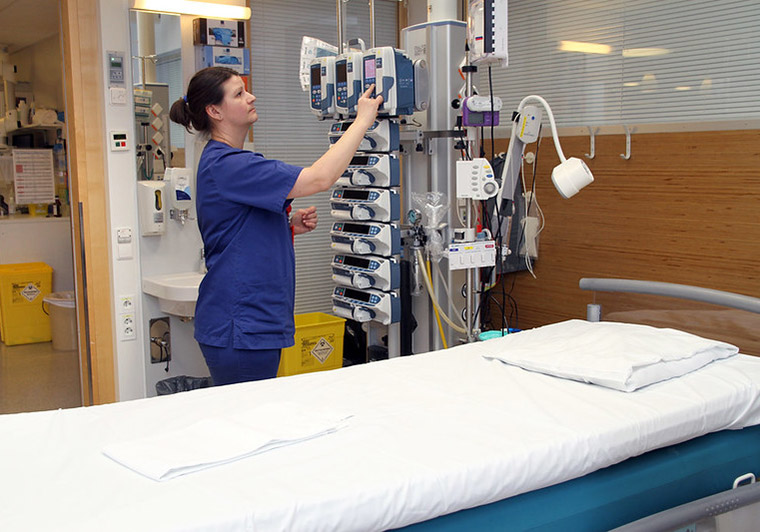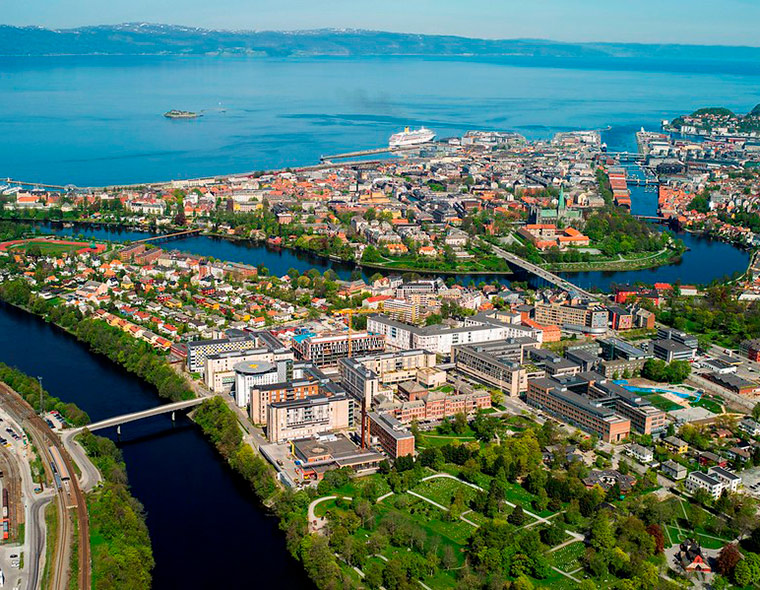Norway's healthcare is not free, but it is heavily subsidised. The Norwegian healthcare system is founded on the principles of universal access, decentralisation and free choice of provider.
One topic that's rarely out of the news is healthcare. That's especially true in the US and the UK, with the debate on national healthcare seemingly a never ending one.

Scandinavian healthcare is frequently held up as some sort of ideal model. But there's a lot of misconceptions about how the system works. So, let's take a look.
Table of Contents
The Nordic healthcare model
Norway and the rest of the Nordic region are frequently held up as an example of successful national systems. As such, many foreigners are interested in learning exactly how the system works – and what Norwegians think of it.
On a per person basis, Norwegian expenditure on healthcare is the highest in the world. Every member of the Norwegian National Insurance scheme has the right to access healthcare services. Broadly speaking, that's every resident taxpayer of Norway.

However, treatment is not free. Norwegian residents pay for healthcare services at the point of service. That being said, fees are subsidised and there is an annual limit on how much any one individual has to pay for healthcare. So, how does it work?
Governance of Norwegian healthcare
While health care policy is controlled centrally, responsibility for the provision of health care is decentralised. Local authorities at municipal level organise and finance primary health care services according to local demand. The central Government has overall managerial and financial responsibility for the hospital sector.
All public hospitals in Norway are run by four Regional Health Authorities (RHA) overseen by the Ministry of Health and Care Services. These are central, north, south and east, and west.
This structure has been in place since the reform of 2002, revised in 2007. Some criticism of the move included the cost and inefficiency of an added layer of administration.

A small number of hospitals are privately owned. However, most private hospitals are funded by the public. Private health insurance is not at all commonplace.
Urgent medical care in Norway
If you or someone else is in a life-threatening condition, call 113. Operators will assess the situation and send an ambulance if required.
113 operators can also mobilise the air ambulance if the situation requires it. Norway's air ambulance service operates from 20 bases across the country using fixed-wing aircraft and helicopters.
GP services
If you are a resident of Norway, an asylum seeker or NATO personnel you are entitled to a fastlege. Simply put, this is the Norwegian equivalent of a general practitioner (GP). 99% of Norwegians have registered with a fastlege.
Each fastlege manages their own appointments system. In cities, groups of GPs tend to work from a single medical facility to take advantage of scale.
Not happy with your GP? Provided the doctor of your choice has vacancies, you can register with them free of charge. You change your registration up to twice per year. Any change is effective from the first day of the following month.
How much does treatment in Norway cost?
Healthcare in Norway is not free. Residents must pay for all treatment and even a standard consultation with a GP.

However, once a person reaches an annual limit of expenditure (currently just over 2,000kr), they receive an exemption card which entitles them to free treatment for the remainder of the year.
This system ensures that everyone pays a little, but the sick are not burdened with the stress of huge medical bills. The exemptions to this system include children under sixteen and pregnant women, who receive free healthcare.
Administration of healthcare
The organisation Helfo, part of the Norwegian Directorate of Health, is your primary access point for healthcare administration in Norway. Through Helfo you can choose or change your regular GP, order a European Health Insurance Card and obtain reimbursement of medical expenses when appropriate.
Medical records
Every individual in the healthcare system will have a digital healthcare file. This records notes made by your GP and information from hospitals, specialists and other health institutes, such as test results.
Privacy is important and only you and healthcare personnel directly involved in your treatment are able to access the records. Individuals can access their own records online. You have the right to access your health records and to have any difficult to understand terms explained.

In addition, you have the right to know who has accessed the file and/or been provided with information from it. At present, digital access to your medical records is offered to all patients over the age of 16 and those with parental responsibility for children under 12.
Healthcare abroad
If you are a member of the Norwegian National Insurance Scheme and are staying temporarily in another EEA country or in Switzerland, you should carry a European Health Insurance Card (EHIC), which you can obtain from Helfo. This entitles you to access the same healthcare services as a citizen of the country that you are temporarily staying in.
Healthcare for visitors
A similar process applies for those visiting Norway. If you are from an EU/EEA country or Switzerland, you have some healthcare rights when visiting Norway. Bring your EHIC with you, as it's this card that proves your right to treatment. You will still have to pay for treatment in the same way as Norwegians do.
If you are from another country, private healthcare insurance is a must. Check your travel insurance policy to see what is–and what isn't–covered.
Dental care in Norway
Generally speaking, only children receive free public dental care in Norway. With some exceptions such as those with rare medical conditions, adults have to pay.
However, NAV will consider cases of support for those in financial need, in accordance with Norway's Social Services Act. Elderly people who live at an institution or have received home nursing care for more than three months also receive free treatment.


i want to study nursing with schoolarship in Norway. can you suggest me an universities. Cureently i m living in finland and just finnished qualification in Business administration from porvoo international college. Previously i studied Profociency level of Nursing from Nepal.
The article states that “On a per head basis, Norwegian expenditure on healthcare is the highest in the world.” Do you know approximately what the expenditure per head is and also how the healthcare system is funded?
I am seriously thinking of getting a job in Norway as a Nurse. I have a PhD in Adult Education and Nursing Education that I got in the United States of America. I also have a Family Nurse Practitioner Certification as well. I am 57 years old. What is my chance of getting a job in Norway.
I am studying “health and Society” this quarter and my project this week is medical in other countries and how it differs from the US, which is where I reside. Anyway, I am searching for the answer of portability with healthcare in Norway, and the question is, “Does a person’s coverage continue even if they lose their job or move to another region?
Of course. It is a national health service open to all, funded via the tax system and not individual insurance premiums.
I have a work permit in Norway for 3 years and I have a little boy who is under chemotherapy treatments for leukemia can he continue his treatments in Norway he is Canadian too and he receives his treatments well in Canada the only reason is that I found a good job in Norway
i am asking about if his treatements will be covered by the Norway health insurance as he had already leukemia before
Think of the “Personal GP” (=Fastlege) as a gatekeeper !
In the Norwegian public health-system you will need an “OK” to see a specialist in public hospitals.
-Emergency other rules of course..!
We do have Private options, both Physicians and hospital, -if you have the money…
(I would go Public / Helfo, -it`s there the “Good stuff” is IMHO. …)
a.
It is the same in the U.K. with every person registered with a general practitioner who is the first port of call for all health problems other than ones requiring emergency care which go straight to accident and emergency. All secondary care referrals have to be made via the GP. This prevents the secondary care system having unnecessary referrals that can be managed in primary care as well as primary care providing preventive and screening health care. Health in the U.K. is free at the point of delivery to all U.K. nationals but funded through taxation. This does lead to underfunding of the system and the U.K. nhs is currently in crisis with a huge deficit of health care staff compared to the required number for the population.
From: https://www.daria.no/skole/?tekst=4876
Introduction:
This assignment (project) is mainly about the Health Care System in the United States of America. Reason for why I have chosen this topic is because I am very interested in health matters generally because many of my closest friends are professionals in this field and we often discuss topics concerning health and thing related to this topic. My knowledge about the American system is very short at this time. My goal is to learn about how the health system is functioning in United States of America. I hope that I will achieve some knowledge about the health system over there when I have completed this assignment. I will try to describe how the system is functioning and its influences towards the social welfare system. I will also shortly describe the functioning of the Norwegian System and how it is build up. I,ll try to compare these two systems with each other and make a conclusion about which system I believe is the best for the society generally. I will also give an opinion about which system of mentioned above is best to live in where i would prefer to spend my and my children,s life in.
…
The American Health Care system
The American health care system is totally different compared to the health services in Norway. Whenever a citizen have any need for assistant concerning health services, the government provides it immediately and covers all costs that are caused by that in Norway. The American system is based on a different structure where things work totally different. If you unfortunately needs any assistance concerning health matters in USA you are in that situation totally dependent of a health insurance (I,ll describe this phenomenon some later in this assignment).
a.
I’m an American, and I can help with some of the US healthcare info. 1st off, there has always been healthcare for everyone, provided by the federal govt., called Medicaid. However, you had to be elderly, over the age of 65, very poor, or handicapped in some way in order to access it. The affordable care act made it so you could have affordable access to health insurance. Sounds good right? Nope! To be considered poor your income had to be less than $12,000 annually if you were single and less than $24,000 annually for married couples etc. if you received $1 more than the lower limit you didn’t qualify, which meant that most people earn just over the “poverty” limit but not enough to buy into an insurance plan therefore numerous families went without. The Federal govt., is like the EU, the states are similar to individual countries in the EU. Each state has their own public/govt. insurance given to those who qualify. Qualifications vary from state to state. So what may be considered low income in one state may not be considered low income in another. The affordable care act made it possible for all individuals and families to have access to health care. There are still a lot of families who have access to a doctor now but they still can’t afford to pay the premium or the copays so they don’t go to the doctors. Nice of the insurance companies huh? “Sure we’ll allow people to be covered. We just won’t make it easy for them to pay their part.” Sorry, my maniacal voice. Pushing on… Most employers offer health insurance and if they offer it, you have to purchase it or subscribe to it before you can even think about going to the state for aid. Insurance’s are not created equal in the US. For instance, I am covered under my husbands employers insurance. We pay nothing to be apart of this insurance. We have minimal copays for medications, and minimal copays for general practitioner visits. $20 copays for a specialist. $100 for emergency room and nothing is charged if I am admitted to the hospital. This is very rare. I opted to be covered under my husband for this reason. Now my employer offers health insurance. The best plan, with lower more affordable copays is over $500 a month. Yes, you heard it. My coworkers pay over $500 a month for health insurance. That is $6500 out of pocket for health insurance a year. Add your copays, which are out of pocket costs you have to pay per visit and it’s $20-50 per visit for GP-Specialist. Some insurances have a family, out of pocket cap, on top of the insurance you pay and the copays you dish out. It can be as high as another $5000 per family. This deductible is hurting families. My coworker, years ago opted for a back to back rotator cuff surgery vs 1 surgery, rehab and then a year later the other surgery with rehab. All because the back to back surgery, deductibles were cheaper than waiting another year to heal in between. Would you pay $5000 once or $10,000, with healing time? I don’t know if my coworkers still have a family deductible or not. I’m a firefighter and the average firefighter in my city earns with overtime $70,000 a year. Most of their spouses also work and make the equivalent. We can afford our insurance, but not if our spouse wasn’t working. What if their spouse decides to stay at home to raise the children? My coworkers who have stay at home wives, work another full time job on the side, and still try to work overtime. They are always working. If they don’t then they have to pay for day care on top of the health insurance. Don’t even get me started on daycare in the US! Every employer is different. The insurance offered depends on if the business is large or small. The larger the business the better the insurance because the more people are buying the insurance. Think of buying paper towels in bulk. It’s cheaper to buy the 12 pack than a 2 pack. Small businesses are now forced to provide health insurance for their employees. Some small businesses will get together with other small business and pool their resources so they can get a better insurance bundle at a more reasonable rate for their employees. (think co-op like) Now at the individual states level, I stated previously that qualifications vary. Cost of living in Massachusetts is much higher than in Kentucky, so the poverty line is higher in Massachusetts than in Kentucky. Every time the minimum wage is increased the poverty line is also adjusted. (Which is messed up because the whole reason for a minimum wage increase is so people make more.🤔) The insurance companies will get payed one way or another. Universal health care in the US as seen in Scandinavia or other parts of the world will NEVER be seen in the US. Hospitals used to turn people away at the emergency room if they didn’t have insurance. They passed legislation and now you cannot be denied access to the emergency room for any reason. What did that do? It opened up people using the emergency room as their way to get a checkup, or to be seen for a cold, which was not the intent just how things turned out years later. Check out more here: https://www.ncbi.nlm.nih.gov/pmc/articles/PMC1305897/ Many people think the grass is greener on the other side. We pay for everything in the US. The average car is $40,000. The average home is $250,000. University is $30,000 per year, and that’s at a public, in state university. If your child is brilliant and graduates in the top 10% of their class, they might get a full ride scholarship to a great university. If your child is smart but with the majority in the top 30% of their class, they will get into just about any university but if you make more than $70,000 as a couple then your child is not getting help with college. The tuition and fees are all on you. Honestly, it’s not the tuition, it’s the fees. I and many other people would gladly pay more in taxes if it meant we didn’t have to pay exorbitant health care coverage and university costs. As it stands, the affordable care act has allowed us access to health insurance. This also raised the age our children are covered till. It used to be the children were cut off at 18 if not in school full time or 21 if they were in school full time. That has been extended to 26 years of age. This was huge in covering young adult children who had not established themselves in a career. This is still in place. Now they have to fix the insurance companies to stop gauging. Another not so equal part of our insurance. Depending on which insurance you have and where you are in the country, some insurances won’t cover you if you leave the region. Mine will cover me, anywhere in the US, Canada and Mexico if I am on vacation/holiday. If I move or have been found to have moved to another state, like Florida, yet have Massachusetts insurance, they will cancel your insurance. I truly believe that if you enrolled in an insurance plan and you’re paying the premium and you move then your insurance should cover you. It’s the same country! When we travel out of the country we buy travel insurance to cover any medical costs while abroad. I don’t know the criteria but I do know that Massachusetts has an influx of migrants because of the ability to get assistance is easier than some other states. Again it’s based on income.
In doing a bit of research on another topic, I discovered that the average income tax paid by Norweigans is 37%, which is actually the lowest that it’s been in 20 years. The average income tax paid by US citizens is 14%. If you combine your and your husband’s income and multiply by the 23% difference, that is the cost of having the healthcare and other social services you’d receive in Norway. Would you be happy to pay $23,000 on a $100,000 annual salary to get those additional services? The healthcare costs you outline are $6500 for health insurance and a deductible of $5,000 for a total of $11,500. Sure, if you need daycare for your kids, it could look like a great deal now, but you get to pay the extra tax forever to help others with daycare. Now, if you and your husband make more like $150,000/year, you’ll be paying an extra $34,500 each year in tax. Doesn’t make sense to me.
37 % is the average top marginal rate. The average tax paid across your income in Norway is about 25 %. But the way Norwegian taxes are set up, you then take home the remaining 75%.
14% is the average federal income tax paid by Americans. According to the Bureau of Labors calculations, the total tax paid by an American family is 24%. That includes federal, state, municipal, medicare, and social security.
This incidentally fits my own observation that the total taxes on you in Norway is very close to a high-tax state in the US.
If you want to throw in VAT, which is not included above, Norwegian taxes go a bit up compared to the US. Norwegian VAT ranges from 0-25 % based on the type of good. US VAT tends to be lower. However, VAT is normally accounted for in purchasing parity calculations, so if you shove the over to the tax calculation you have to allow for the fact that unadjusted for cost of living the Norwegian median income for a person is nearly 30 000$ above the US median household income.
In total adjusted for taxes and cost of living, US and Norwegian median household incomes are a couple of hunderd dollars apart -but the Norwegian households have things like healthcare, college, unemployment insurance, a years parental leave, 5 weeks of vacation, guaranteed pensions, etc etc on top of their wage.
Hi David
Thanks for the article. Could you tell me how health care is accessed during out of hours? ie at night and at weekends
I have a work permit in Norway for 3 years and I have a little boy who is under chemotherapy treatments for leukemia can he continue his treatments in Norway he is Canadian too and he receives his treatments well in Canada the only reason is that I found a good job in Norway
Are medications paid for breast cancer patients after surgery?
I found a job in Norway, and I start in January. I currently live in the USA. My husband is currently looking for a job as well. I know I will get health insurance in Norway, but will my husband also qualify since we are married if he hasn’t found a job yet?